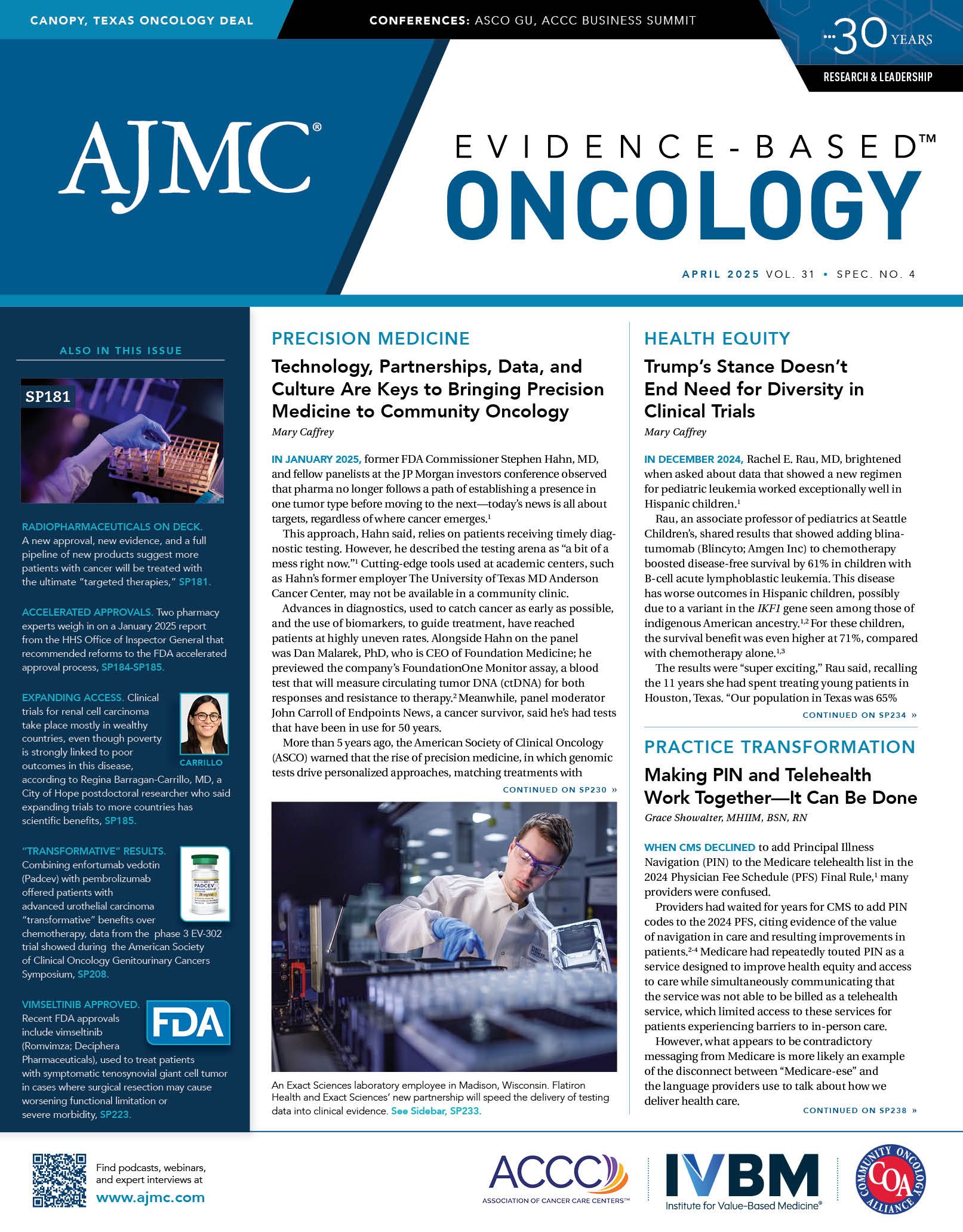- Center on Health Equity & Access
- Clinical
- Health Care Cost
- Health Care Delivery
- Insurance
- Policy
- Technology
- Value-Based Care
Meeting the Financial Needs of Patients With Chronic Conditions
The term financial toxicity entered the discussion of cancer care more than a decade ago1 to highlight the effect a patient’s ability to pay for care would have on the course of their disease. Since then, cancer regimens have become more complex,2 and concerns are growing about increasing numbers of young adults being diagnosed with cancer; this population is known to have issues with the cost of care.3
Despite the rise of financial assistance programs inside and outside pharmaceutical companies, gaps remain, especially for those who will deal with a disease over many years. Accessia Health, founded in 1989, seeks to address the needs not covered by traditional assistance programs.4 Tiara Green, MSEd, president of Accessia Health, answered questions from Evidence-Based Oncology (EBO) about the nonprofit organization and its mission.
EBO: What inspired the creation of Accessia Health? What is your mission?
Tiara Green, MSEd | Image credit: Accessia Health

Green: Accessia Health is a national charitable patient assistance organization that provides programs and services to people of all ages with a rare or chronic health condition. Although navigating health care is challenging for most individuals and families, those battling rare or chronic diseases face even greater challenges with delayed diagnoses, limited treatment options due to their conditions, and restricted access to quality specialist care. These challenges are further compounded by financial constraints that leave many struggling to obtain the care they need.
Founded by a patient with a rare condition, Accessia Health’s mission is to provide a financial safety net, products, services, and assistance to individuals with rare or chronic health conditions and their families. We’re committed to breaking down the financial and systemic barriers that hinder one’s ability to access lifesaving treatments and services. Our holistic approach includes financial support that extends beyond traditional co-pay assistance to cover other medical expenses such as travel, medical equipment, diagnostic testing, and even dental treatments. Through this model, patients have the ability to focus on their health and getting better rather than worrying about how to afford essential care.
EBO: Do you provide services for patients and physicians?
Green: Accessia Health provides flexible financial assistance and services that help patients and families navigate the evolving world of health care regulations and policy. In addition to financial assistance, we offer educational resources and legal support for disability claims, all aimed at improving a person’s ability to make informed health care decisions.
However, our work coincides with [the work of] providers. The resources we provide streamline access to timely care, including early detection and necessary treatment options. Many individuals with costly conditions struggle to afford health care expenses that impact their ability to follow care plans recommended by their providers, leading to poorer health outcomes. By working in tandem with providers, we address the root cause of gaps in care and ensure that financial pressures do not prevent people from receiving the care they need or force them to choose between their health and paying for basic necessities.
EBO: What is your business model? Is there a cost for the patients?
Green: Our programs rely on funding and donations from individuals, corporations, and foundations. Patients can access resources and apply for financial assistance at no cost. Accessia Health provides financial assistance to those who meet eligibility criteria. Our program model, Your Assistance, Your Choice, allows patients to allocate those funds based on their needs and circumstances. This is a unique model that differs from traditional assistance programs, which have historically only covered costs associated with medication co-pays or health insurance premiums.
EBO: You help patients with rare and chronic diseases. How do you determine if a patient can receive funding from your organization?
Green: Accessia Health offers financial assistance for various rare and chronic conditions. If an individual has a qualifying condition, [a list of] which can be found on our website,4 they begin by submitting an application. Eligibility is determined by a variety of factors, including diagnosis, household income, and program availability. We strive to accommodate as many patients as possible and continue to expand our offerings with new assistance programs each year. Financial need is assessed to ensure that support reaches those who need it most, and our team members help support this process by connecting patients with additional resources and helping them understand their insurance options and benefits.
EBO: From your vantage point, are financial toxicity challenges improving or worsening?
Green: Financial toxicity continues to be one of the most pressing challenges in health care, with people facing the overwhelming burden of affording essential treatments and services. This concern is even more pressing for those with rare or chronic conditions due to the high price tags associated with specialized, often experimental, therapies.
Recent data show that Americans collectively hold $220 billion in medical debt, with nearly 3 million people owing more than $10,000 each.5
Legislative efforts such as the Inflation Reduction Act of 2022 aim to address financial toxicity by capping out-of-pocket expenses for Medicare beneficiaries and lowering prescription drug costs. Although these changes are a step in the right direction, gaps in coverage persist, and many still struggle to access affordable health care.
High out-of-pocket costs and health insurance premiums continue to put a strain on individuals and families. Those we serve often must choose between paying for essential care and covering basic living expenses. Our goal is to help lighten their financial burden, ensuring no one has to choose between paying for their health care needs or paying their rent.
EBO: Approximately what percentage of the patients you work with have cancer?
Green: Cancer treatment often requires costly therapies that can place significant financial strain on patients and their families. To date, nearly 25% of our patient population has a cancer diagnosis.
EBO: We still hear about problems with reimbursement for diagnostics. What does the landscape look like from your perspective?
Green: Reimbursement and insurance coverage challenges for diagnostic testing continue to be a major issue, particularly for those with rare conditions who require specialized testing to confirm their diagnosis. Insurance coverage for diagnostics is often limited, leading to significant out-of-pocket costs and delays in diagnosis. In many cases, early intervention can lead to better health outcomes.
At Accessia Health, we recognize the importance of diagnostics in a person’s health care journey. That’s why our model allows patients to use their financial assistance for diagnostic testing if needed. By providing this flexibility, we help reduce financial constraints that could delay critical health care decisions.
EBO: Is there anything you would like to add?
Green: In order to offer a truly holistic care model, it is critical for charitable patient assistance organizations to consider social determinants of health when offering programs and services. At Accessia Health, we supplement our flexible financial assistance programs by offering educational content that builds health literacy and partnering with local community organizations to connect patients with essential resources.
In addition, we prioritize equitable access, which means underserved and often marginalized communities are able to utilize our services as readily as any other individual. Our case managers assist with navigating the evolving complexities of the health care system, including regulations and policy changes. By combining financial assistance with education and advocacy, we empower patients with the knowledge and tools to obtain quality, affordable care.
Author Information
With more than 20 years of expertise in public health and nonprofit sectors, Tiara Green, MSEd, drives strategic initiatives and health equity programs for Accessia Health to address unmet needs in health care and offer comprehensive support to individuals facing rare or chronic diseases.
References
1. Zafar SY, Peppercorn JM, Schrag D, et al. The financial toxicity of cancer treatment: a pilot study assessing out-of-pocket expenses and the insured cancer patient’s experience. Oncologist. 2013;18(4):381-390. doi:10.1634/theoncologist.2012-0279
2. Swanton C, Bernard E, Abbosh C, et al. Embracing cancer complexity: hallmarks of systemic disease. Cell. 2024;187(7):1589-1616. doi:10.1016/j.cell.2024.02.009
3. Thom B, Benedict C, Friedman DN, Kelvin JF. The intersection of financial toxicity and family building in young adult cancer survivors. Cancer. 2018;124(16):3284-3289. doi:10.1002/cncr.31588
4. Accessia Health. Accessed March 17, 2025. https://accessiahealth.org/
5. Rakshit S, Rae M, Claxton G, Amin K, Cox C. The burden of medical debt in the United States. KFF. February 12, 2024. Accessed March 17, 2025. https://www.kff.org/health-costs/issue-brief/the-burden-of-medical-debt-in-the-united-states/

